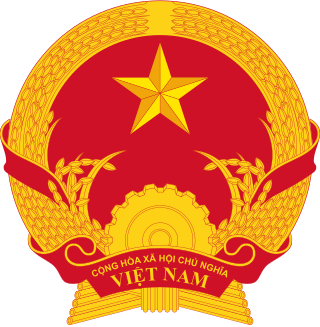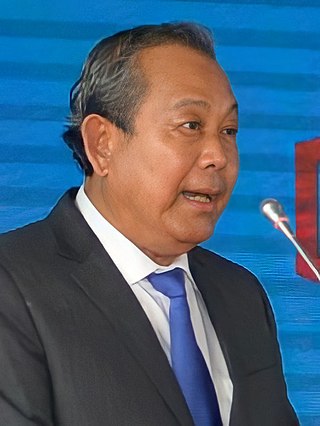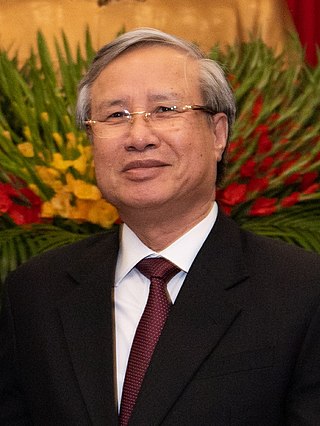
The politics of Vietnam is dominated by a single party under an authoritarian system, the Communist Party of Vietnam (CPV). The President of Vietnam is the head of state, and the Prime Minister of Vietnam is the head of government, both of these are separate from the General Secretary of the Communist Party of Vietnam who leads the CPV and is head of the Politburo and the Central Military Commission, thus the General Secretary is the de facto supreme leader of Vietnam. Executive power is exercised by the government and the President of Vietnam. Legislative power is vested in the National Assembly of Vietnam. The Judiciary is independent of the executive. The parliament adopted the current Constitution of Vietnam, its fifth, on 28 November 2013.

Elections in the Socialist Republic of Vietnam occur under a one-party political system led by the Communist Party of Vietnam (CPV). Direct elections occurred at both the local and national levels to elect members of the People's Councils and the National Assembly, with all candidate nominations pre-approved by the CPV-led Vietnamese Fatherland Front. Elections serve the purposes of information acquisition and cooptation rather than popularity contest but still remain of significance to the political life and legitimacy of the Vietnamese party-state.

The National Assembly of the Socialist Republic of Vietnam is the highest body of state power of Vietnam. The National Assembly is the only branch of government in Vietnam and, in accordance with the principle of unified power, all state organs are subservient to it.

The Supreme People's Court of Vietnam is the highest court of the Socialist Republic of Vietnam. The Supreme People's Court is one of the two institutions at the apex of the judicial system of Vietnam, with the other body being the Supreme People's Procuracy of Vietnam. Both are accountable to the President of Vietnam, the highest institution of government power in the country. The head of the Supreme People's Court of Vietnam is the Chief Justice. The current Chief Justice of Vietnam is Nguyen Hoa Binh.

Headed by the Prosecutor General, the Supreme People's Procuracy of Vietnam has functions such as acting as the prosecutor before the People's Courts. The Supreme People's Procuracy has local and military subdivisions that include the district, provincial, and city levels. In accordance with the Constitution of Vietnam, the role of the public prosecutor is to surveillance and supervise the rule of all the organs of the State, ministries and ministerial-level agencies, administrative agencies and individuals.
Military Courts of Vietnam deal with criminal matters within the Vietnam People's Army. They are part of the court system in Vietnam:

The Politburo of the Communist Party of Vietnam, formally the Political Bureau of the Central Committee of the Communist Party of Vietnam, is the highest body of the Communist Party of Vietnam (CPV) in between gatherings of the National Congress and of the plenary sessions Central Committee. According to Party rules, the Politburo directs the general orientation of the government.
1st Military Region of Vietnam People's Army, founded in 1945, is directly under the Ministry of Defence of Vietnam, tasked to organise, build, manage and commander fights against foreign invaders to protect the North East of Vietnam. The north-east region of Vietnam, borders with the Guangxi of China. In 1979, Chinese army with 5 infantry corps, 17 infantry divisions, launched a huge invasion in this military zone, occupied the Lạng Sơn and Cao Bằng. The headquarters of the 1st Military Zone is in Thái Nguyên.
The 5th Military Region of Vietnam People's Army, is directly under the Ministry of Defence of Vietnam, tasked to organise, build, manage and command armed forces defending the South Central Vietnam include the Tây Nguyên and southern central coastal provinces. In the period of Vietnam War, 5th Military Zone included the coastal provinces of Middle Central Vietnam, 6th Military Zone included the old South Central Vietnam and the front Tây Nguyên was merged into 5th Military Zone after Vietnam unification.
The 9th Military Region of Vietnam People's Army, is directly under the Ministry of Defence of Vietnam, tasked to organise, build, manage and command armed forces defending the Mekong Delta.

Trương Hòa Bình is a Vietnamese politician and the former First Deputy Prime Minister of The Socialist Republic of Vietnam. He is considered to be one of the more promising members' of the Vietnamese Government, having previously served as Chief Justice of the Supreme People's Court of Vietnam from 2007 to 2016.

The Viện cơ mật or "Secret Institute", established in 1834, was the Privy Council and key mandarin agency of the royal court of Vietnam's final Nguyễn dynasty at Huế, until the end of the dynasty in 1945.

The 13th Politburo of the Communist Party of Vietnam (CPV), formally the 13th Political Bureau of the Central Committee of the Communist Party of Vietnam (Vietnamese: Bộ Chính trị Ban Chấp hành trung ương Đảng Cộng sản Việt Nam Khoá XIII), was elected at the 1st Plenary Session of the 13th Central Committee (CC) in the immediate aftermath of the 13th National Congress. Nguyễn Phú Trọng was re-elected for his third term as General Secretary of the Communist Party of Vietnam, a position he has held since 2011.

The abdication of Bảo Đại took place on 25 August 1945 and marked the end of the 143-year reign of the Nguyễn dynasty over Vietnam ending the Vietnamese monarchy. Emperor Bảo Đại abdicated in response to the August Revolution. A ceremony was held handing power over to the newly established Democratic Republic of Vietnam, which was established during the end of World War II in Asia as Vietnam had been occupied by French and later Japanese imperialists.

Võ Văn Thưởng is a Vietnamese politician serving as the President of Vietnam since 2023, being the youngest person to serve in this position since the country's reunification. As the country's head of state, Thưởng is the second highest official in Vietnam after Nguyễn Phú Trọng, the general secretary of the Communist Party of Vietnam.

Trần Quốc Vượng is a Vietnamese politician. He was a member of the Politburo of the Communist Party of Vietnam, Permanent Member of the Party Central Committee's Secretariat, Former Deputy Head of Central Steering Committee on Anti-corruption, Member of the National Assembly of Vietnam. He has worked in many units and agencies of the Communist Party of Vietnam and Socialist Republic of Vietnam, serving as Chairman of the Central Inspection Commission of the Communist Party of Vietnam; Head of Central Office of the Communist Party of Vietnam, Secretary of the Party Personnel Committee, Prosecutor General of the Supreme People's Procuracy of Vietnam.

The 13th Secretariat of the Communist Party of Vietnam (CPV), formally the 13th Secretariat of the Central Committee of the Communist Party of Vietnam (Vietnamese: Ban Bí thư Ban Chấp hành Trung ương Đảng Cộng sản Việt Nam Khoá XIII), was partly elected by the 1st Session of the 13th Politburo and partly elected by the 1st Plenary Session of the 13th Central Committee in the immediate aftermath of the 13th National Congress. Nguyễn Phú Trọng was re-elected for his third term as General Secretary of the Communist Party of Vietnam, a position he has held since 2011.
The 12th Secretariat of the Communist Party of Vietnam (CPV), formally the 12th Secretariat of the Central Committee of the Communist Party of Vietnam (Vietnamese: Ban Bí thư Ban Chấp hành Trung ương Đảng Cộng sản Việt Nam Khoá XII), was partly elected by a decision of the 12th Politburo and partly elected by the 1st Plenary Session of the 12th Central Committee (CC) in the immediate aftermath of the 12th National Congress.







